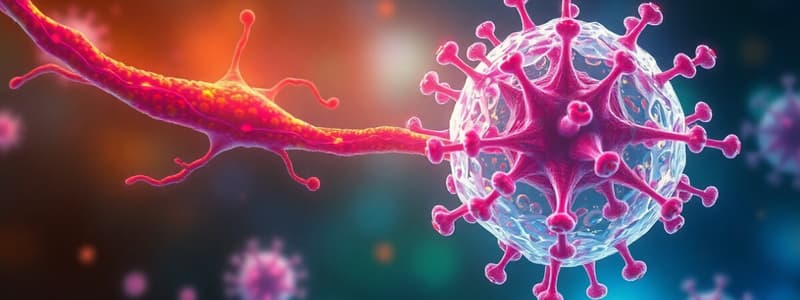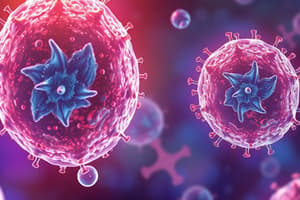Podcast
Questions and Answers
B cell development occurs in primary and secondary lymph organs.
B cell development occurs in primary and secondary lymph organs.
True (A)
The membrane-bound IgM receptor is also known as the B cell receptor (BCR).
The membrane-bound IgM receptor is also known as the B cell receptor (BCR).
True (A)
B cell receptors are made up of three polypeptide chains.
B cell receptors are made up of three polypeptide chains.
False (B)
The variable region of the B cell receptor is responsible for binding to antigens.
The variable region of the B cell receptor is responsible for binding to antigens.
The constant region of the B cell receptor changes in response to different antigens.
The constant region of the B cell receptor changes in response to different antigens.
Disulphide bonds connect the heavy and light chains of the B cell receptor.
Disulphide bonds connect the heavy and light chains of the B cell receptor.
B cells are created with receptors that can specifically recognize all possible antigens.
B cells are created with receptors that can specifically recognize all possible antigens.
Ig domains are characterized by a linear structure.
Ig domains are characterized by a linear structure.
B cells are part of the adaptive immune system.
B cells are part of the adaptive immune system.
Each B cell has the same B cell receptor (BCR).
Each B cell has the same B cell receptor (BCR).
B cells can recognize antigens in various biological forms.
B cells can recognize antigens in various biological forms.
Plasma cells produce millions of antibodies.
Plasma cells produce millions of antibodies.
Antibodies are secreted into the bloodstream and mucus membranes.
Antibodies are secreted into the bloodstream and mucus membranes.
Isotype class switching occurs during T cell activation.
Isotype class switching occurs during T cell activation.
B cells are mainly responsible for attacking intracellular pathogens.
B cells are mainly responsible for attacking intracellular pathogens.
B cell activation leads to proliferation and differentiation into memory cells only.
B cell activation leads to proliferation and differentiation into memory cells only.
Affinity maturation is a process that occurs during B cell development.
Affinity maturation is a process that occurs during B cell development.
B cells can develop from T cells.
B cells can develop from T cells.
BCR rearrangement is part of the B cell development process.
BCR rearrangement is part of the B cell development process.
Antibodies are also known as immunoglobulins.
Antibodies are also known as immunoglobulins.
All B cells differentiate into memory cells after activation.
All B cells differentiate into memory cells after activation.
B cells can only recognize protein antigens.
B cells can only recognize protein antigens.
Diseases associated with B cell deficiencies can lead to increased susceptibility to infections.
Diseases associated with B cell deficiencies can lead to increased susceptibility to infections.
Antibodies are secreted proteins that recognize ‘epitopes’ on pathogens.
Antibodies are secreted proteins that recognize ‘epitopes’ on pathogens.
The constant region of an antibody is responsible for recognizing epitopes.
The constant region of an antibody is responsible for recognizing epitopes.
Epitopes can only be proteins.
Epitopes can only be proteins.
The ‘type’ of constant region determines the isotype of an antibody.
The ‘type’ of constant region determines the isotype of an antibody.
The variable regions of antibodies are crucial for binding to pathogens.
The variable regions of antibodies are crucial for binding to pathogens.
B cells are removed by negative selection if they bind to self-peptide too weakly.
B cells are removed by negative selection if they bind to self-peptide too weakly.
Epitopes are recognized by T and B cell receptors.
Epitopes are recognized by T and B cell receptors.
Naïve B cells possess a functioning BCR before antigen exposure.
Naïve B cells possess a functioning BCR before antigen exposure.
Complement proteins are part of the constant region's function.
Complement proteins are part of the constant region's function.
B cell activation requires only the binding of antigens to the BCR.
B cell activation requires only the binding of antigens to the BCR.
Both B cells and T cells specific to an antigen meet in the lymph node.
Both B cells and T cells specific to an antigen meet in the lymph node.
Fab stands for 'Fragment antigen-binding' in antibodies.
Fab stands for 'Fragment antigen-binding' in antibodies.
Activated T helper cells can drive B cell proliferation and differentiation through cytokines.
Activated T helper cells can drive B cell proliferation and differentiation through cytokines.
CD40L is a molecule that binds to CD40 on T cells.
CD40L is a molecule that binds to CD40 on T cells.
MHC class II is involved in the presentation of peptides by B cells to T helper cells.
MHC class II is involved in the presentation of peptides by B cells to T helper cells.
B cells are effective phagocytes and antigen-presenting cells (APCs).
B cells are effective phagocytes and antigen-presenting cells (APCs).
To achieve full activation, B cells require signal 2 from activated CD8 T cells.
To achieve full activation, B cells require signal 2 from activated CD8 T cells.
Weak binding of self-antigens does not lead to the removal of B cells.
Weak binding of self-antigens does not lead to the removal of B cells.
Is IgG the first antibody secreted upon infection?
Is IgG the first antibody secreted upon infection?
B cells can isotype switch to produce IgA, IgE, and IgD isotypes.
B cells can isotype switch to produce IgA, IgE, and IgD isotypes.
During isotype switching, the antigen binding site changes.
During isotype switching, the antigen binding site changes.
Affinity maturation is the process by which antibody affinity decreases with repeated exposure.
Affinity maturation is the process by which antibody affinity decreases with repeated exposure.
CD40-CD40L interaction plays a role in isotype switching.
CD40-CD40L interaction plays a role in isotype switching.
Macrophages and basophils are types of immune cells that have Fc receptors.
Macrophages and basophils are types of immune cells that have Fc receptors.
Random mutation does not affect the affinity of antibody-producing B cell clones.
Random mutation does not affect the affinity of antibody-producing B cell clones.
The constant region of the heavy chain is replaced during isotype switching.
The constant region of the heavy chain is replaced during isotype switching.
Neutrophils are a type of adaptive immune cell.
Neutrophils are a type of adaptive immune cell.
Isotype switching can happen due to cytokines released by T helper cells.
Isotype switching can happen due to cytokines released by T helper cells.
IgG is the only antibody class that can cross the placenta.
IgG is the only antibody class that can cross the placenta.
IgA is primarily involved in opsonization of pathogens.
IgA is primarily involved in opsonization of pathogens.
Eosinophils and mast cells bind IgE antibodies.
Eosinophils and mast cells bind IgE antibodies.
Antibody-dependent cellular cytotoxicity is mediated primarily by T cells.
Antibody-dependent cellular cytotoxicity is mediated primarily by T cells.
IgM is the first antibody to be secreted during an immune response.
IgM is the first antibody to be secreted during an immune response.
The neutralization function of antibodies requires the Fc region.
The neutralization function of antibodies requires the Fc region.
Most helminths can be easily phagocytosed by immune cells.
Most helminths can be easily phagocytosed by immune cells.
The complement activation process does not involve antibody binding.
The complement activation process does not involve antibody binding.
B cells can have antibodies with varying heavy chains.
B cells can have antibodies with varying heavy chains.
IgG antibodies are effective at preventing intracellular infections.
IgG antibodies are effective at preventing intracellular infections.
Opsonization enhances the ability of phagocytes to recognize pathogens.
Opsonization enhances the ability of phagocytes to recognize pathogens.
Mast cells release histamine when activated by IgG binding.
Mast cells release histamine when activated by IgG binding.
Natural Killer cells express FcγRIII receptors to bind IgG.
Natural Killer cells express FcγRIII receptors to bind IgG.
Flashcards
B cell role
B cell role
B cells are part of the adaptive immunity, making antibodies to fight pathogens, mainly those outside cells.
B cell receptor (BCR)
B cell receptor (BCR)
Each B cell has a unique BCR that recognizes foreign antigens in different forms.
B cell activation
B cell activation
Antigen recognition by BCRs leads to B cell proliferation and differentiation into plasma cells.
Plasma cell function
Plasma cell function
Signup and view all the flashcards
Antibodies (Immunoglobulins)
Antibodies (Immunoglobulins)
Signup and view all the flashcards
Antigen
Antigen
Signup and view all the flashcards
Adaptive immunity
Adaptive immunity
Signup and view all the flashcards
B cell development
B cell development
Signup and view all the flashcards
B cell receptor rearrangement
B cell receptor rearrangement
Signup and view all the flashcards
Isotype class switching
Isotype class switching
Signup and view all the flashcards
Affinity maturation
Affinity maturation
Signup and view all the flashcards
Extracellular pathogens
Extracellular pathogens
Signup and view all the flashcards
B cell deficiencies
B cell deficiencies
Signup and view all the flashcards
Immunoglobulin
Immunoglobulin
Signup and view all the flashcards
Effector responses
Effector responses
Signup and view all the flashcards
Antibody structure
Antibody structure
Signup and view all the flashcards
B cell development stages
B cell development stages
Signup and view all the flashcards
Epitope
Epitope
Signup and view all the flashcards
BCR structure
BCR structure
Signup and view all the flashcards
Variable region
Variable region
Signup and view all the flashcards
Constant region
Constant region
Signup and view all the flashcards
Variable region of BCR
Variable region of BCR
Signup and view all the flashcards
Isotype
Isotype
Signup and view all the flashcards
Constant region of BCR
Constant region of BCR
Signup and view all the flashcards
Ig domain
Ig domain
Signup and view all the flashcards
Fab fragment
Fab fragment
Signup and view all the flashcards
B cell receptor variability
B cell receptor variability
Signup and view all the flashcards
Antigen-binding site
Antigen-binding site
Signup and view all the flashcards
Types of BCR chains
Types of BCR chains
Signup and view all the flashcards
Signal 1
Signal 1
Signup and view all the flashcards
Signal 2
Signal 2
Signup and view all the flashcards
B cell antigen receptor (BCR)
B cell antigen receptor (BCR)
Signup and view all the flashcards
Negative selection of B cells
Negative selection of B cells
Signup and view all the flashcards
Self-antigen
Self-antigen
Signup and view all the flashcards
T helper cells
T helper cells
Signup and view all the flashcards
Antigen Presentation
Antigen Presentation
Signup and view all the flashcards
MHC class II
MHC class II
Signup and view all the flashcards
Cytokines
Cytokines
Signup and view all the flashcards
Antibody Isotype Switching
Antibody Isotype Switching
Signup and view all the flashcards
Fc portion
Fc portion
Signup and view all the flashcards
IgM
IgM
Signup and view all the flashcards
IgG
IgG
Signup and view all the flashcards
CD40-CD40L Interaction
CD40-CD40L Interaction
Signup and view all the flashcards
B cells
B cells
Signup and view all the flashcards
Helper T cells
Helper T cells
Signup and view all the flashcards
Antibody Effector Functions
Antibody Effector Functions
Signup and view all the flashcards
Neutralization
Neutralization
Signup and view all the flashcards
Opsonization
Opsonization
Signup and view all the flashcards
Phagocytosis
Phagocytosis
Signup and view all the flashcards
Complement Activation
Complement Activation
Signup and view all the flashcards
Antibody-Dependent Cellular Cytotoxicity (ADCC)
Antibody-Dependent Cellular Cytotoxicity (ADCC)
Signup and view all the flashcards
Mast Cell/Eosinophil-Mediated Reactions
Mast Cell/Eosinophil-Mediated Reactions
Signup and view all the flashcards
Antibody Isotype
Antibody Isotype
Signup and view all the flashcards
Fc Region
Fc Region
Signup and view all the flashcards
Study Notes
Adaptive Immunity - B Cells
- B cells are part of the adaptive immune system, responding to specific antigens.
- They produce antibodies, crucial for fighting pathogens (mainly extracellular).
- B cells have a unique B cell receptor (BCR) that recognizes antigens.
- Antigens can be proteins, carbohydrates, lipids, or polysaccharides.
- Antigen recognition activates B cells, leading to proliferation and differentiation into plasma cells.
- Plasma cells produce many antibodies which can be secreted into the blood and mucous membranes.
- Antibodies are also known as immunoglobulins.
- B cells develop through a series of stages in generative and peripheral lymphoid organs.
- B cell development includes BCR rearrangement to achieve unique antigen specificity.
- B cells undergo development checkpoints for confirmation of BCR and self antigen recognition.
- B cell activation requires two signals: antigen binding to the BCR (signal 1) and T helper cell interaction (signal 2).
- T helper cells and DCs help activate B cells.
- Isotype switching allows antibodies to adapt to different pathogens, changing the constant region without altering the antigen binding site.
- Affinity maturation improves antibody binding to the target antigen through mutations and selection.
- Antibodies have effector functions like neutralization, opsonization, complement activation, and antibody-dependent cellular cytotoxicity.
- Deficiency of B cells or antibodies can lead to increased vulnerability to bacterial and viral infections.
- Types of heavy chains for different antibody classes are shown.
Studying That Suits You
Use AI to generate personalized quizzes and flashcards to suit your learning preferences.




